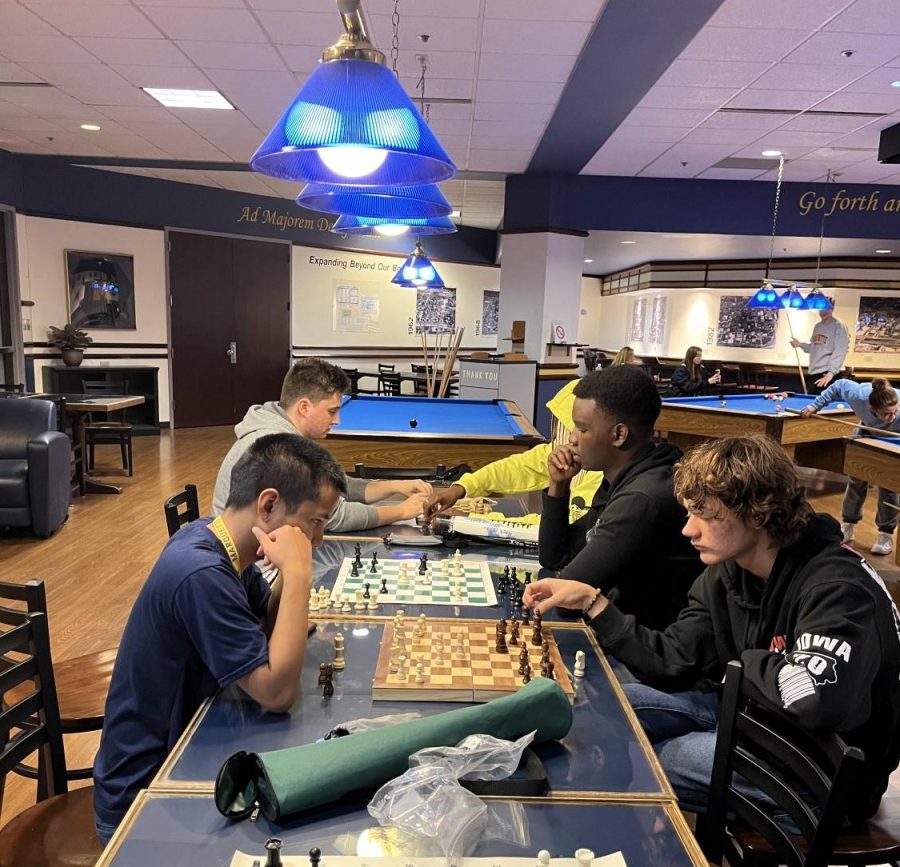The pawns advance, the knights arrive on the flank, the queen bounds forward and the rook slides in behind the defenses to deliver the final blow. The attack cannot be stopped, the king cannot move and it is checkmate.
Chess is a game originally created in 7th century India, under the name “chaturanga.” But in the 11th century, the game spread to Persia, where it received its current name and jargon. Chess stemmed from “shah,” meaning king, and checkmate from “shah mat,” meaning “the king is helpless.”
Throughout its history, chess has been a benchmark of human brilliance, flair and artistry. Because of this, chess has a reputation of being a game only for geniuses, something Marquette chess club President Deven Johnson, a junior in the College of Arts & Sciences, said he hopes to change.
“I struggled with that for so long when I was first thinking about getting into chess,” Johnson said. “You don’t have to be a genius to get better at chess … You can be as good at chess as you want to be.”
Johnson said with chess, you get out what you put in and it does not matter how smart you are.
He mentioned how Hikaru Nakamura, the current sixth-best chess player in the world, famously took an IQ test and the results showed average intelligence.
“His IQ was like 102. It was extremely average,” Johnson said. “He’s an amazing chess player, because he just puts in a lot of work.”
Johnson said he learned the rules of chess as a child, but it was not until the COVID-19 pandemic that he became very interested in the game.
“I didn’t get really serious about chess until the pandemic in June of 2020. I just saw some interesting videos on YouTube about it and some funny videos that caught my intention,” Johnson said. “I decided to start playing and I’ve been playing since then. I started playing online, seriously, around September of 2020.”
After taking a year off for COVID, Johnson said he knew he wanted to immerse himself in chess club last fall.
“I figured, ‘Okay, chess club at Marquette is probably not insignificant,’” Johnson said. “Mainly, I just wanted to play with other people, learn from other people and see what chess was really about.”
Ross Dziallo, a sophomore in the College of Arts & Sciences, also played chess as a child, but he said he was drawn to the game for another reason.
“My dad played it with me; I enjoyed the simplicity of what you needed to play it and the utter complexity of the game itself,” Dziallo said.
This year, the chess club held its first meeting Sept. 9 in the Brooks Lounge at the Alumni Memorial Union.
The club had different stations for all different levels of players, something club Vice President Joe Marsicano, a senior in the College of Business Administration, wanted to see.
He said that Johnson and him want to make the club more instructional this year.
“We are actually devoted to teaching people and that’s something we felt last year definitely could’ve been worked on a little bit more,” Marsicano said.
He noted that anyone can join the club, it does not matter how talented you are or how long you’ve been playing chess.
“You could’ve never even heard of the game of chess and we would be more than glad to help you and we will teach you,” Marsicano said.
The club plays in the Collegiate Chess League, where schools compete for $20,000. They play thirty-six rounds of chess across six weeks in the regular season. In the playoffs, they are placed into divisions and play bracket-styled elimination rounds against other colleges.
In this league, the club not only competes against schools in the states, such as Duke University and The Ohio State University but also competes against schools from around the world.
“There was a school from India, as well as a school from Singapore,” Marsicano said. “So you just got a huge variety of different people you would play throughout the world.”
Johnson said he wants people who are on the fence about playing chess to know that they should not be nervous to take the next step.
“Go out and watch some content, go on YouTube and see just how fun it can be,” Johnson said. “For someone who’s interested in chess, just put yourself out there and you’ll find that it’s a lot more fun than you think.”
This story was written by Jack Albright. He can be reached at jack.albright@marquette.edu or on Twitter @JackAlbrightSJ.




